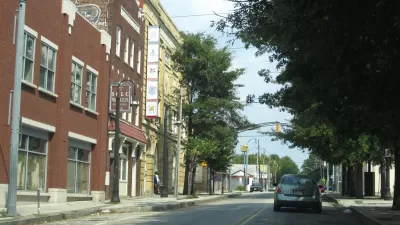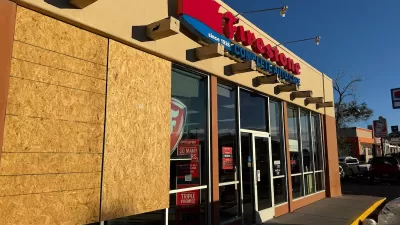Tim Keane says quality design isn’t negotiable and developers need to aim higher.

Atlanta Planning Commissioner Tim Keane came from Charleston, South Carolina, in 2015, and he is on a mission to raise the city's design standards. He says design has not been a priority in Atlanta, and he has sent projects back to developers telling them they will not be approved until improvements are made, reports Maria Saporta:
It is his attempt to stop the development of "Mr. Potatohead" buildings – structures where architects add different design features to try to make an ugly building better. Keane would rather architects start out with a simple building design with high quality materials and amenities.
Keane wants developers to think about features like a building's relationship to the street and its proportions. He also thinks historic preservation is crucial in helping Atlanta develop its architectural character, and the design of new buildings should match the quality of older ones.
Keane's focus on design is part of a larger strategy to integrate and balance different facets of the city. "He has been working on a host of institutional changes – the zoning ordinance, a new tree ordinance, an urban ecology framework plan, a more pedestrian-oriented transportation plan and now better design standards," says Saporta.
FULL STORY: Tim Keane to Atlanta: No more ugly buildings; focus on quality design

Trump Administration Could Effectively End Housing Voucher Program
Federal officials are eyeing major cuts to the Section 8 program that helps millions of low-income households pay rent.

Planetizen Federal Action Tracker
A weekly monitor of how Trump’s orders and actions are impacting planners and planning in America.

Ken Jennings Launches Transit Web Series
The Jeopardy champ wants you to ride public transit.

Philadelphia Is Expanding its Network of Roundabouts
Roundabouts are widely shown to decrease traffic speed, reduce congestion, and improve efficiency.

Why Bike Lanes Are Good: An Explainer for the US Transportation Secretary
Sean Duffy says there’s no evidence that bike lanes have benefits. Streetsblog — and federal agencies’ own data — beg to differ.

California Invests Additional $5M in Electric School Buses
The state wants to electrify all of its school bus fleets by 2035.
Urban Design for Planners 1: Software Tools
This six-course series explores essential urban design concepts using open source software and equips planners with the tools they need to participate fully in the urban design process.
Planning for Universal Design
Learn the tools for implementing Universal Design in planning regulations.
Ada County Highway District
Clanton & Associates, Inc.
Jessamine County Fiscal Court
Institute for Housing and Urban Development Studies (IHS)
City of Grandview
Harvard GSD Executive Education
Toledo-Lucas County Plan Commissions
Salt Lake City
NYU Wagner Graduate School of Public Service




























